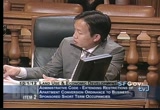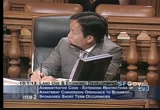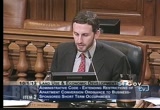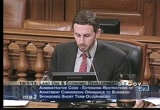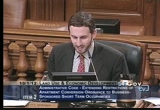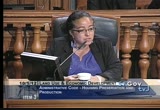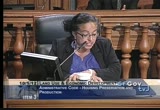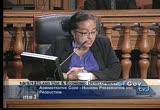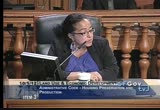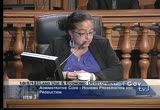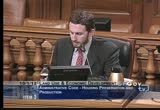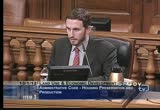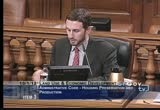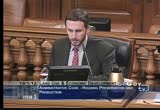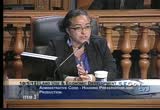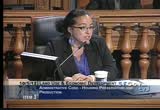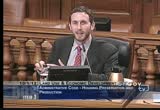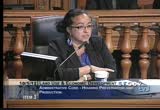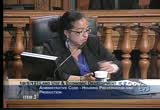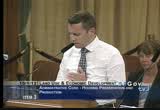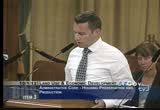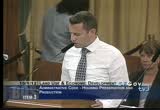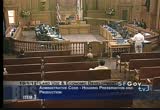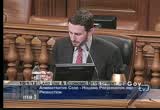tv [untitled] October 10, 2012 3:00pm-3:30pm PDT
3:00 pm
displace residents or long-term tenants. for example, the article that was referenced by mr. paul in the bay citizen suggest there had were landlords that were willing to have tenants move out of their buildings, so that i unit or set of units could be used year-round for these types of practices. from my perspective that is not the type of housing use we want it to see. i think it's one thing to let's say a family that wants to go away a couple of weeks on vackace and if there are students spending a couple of months out of town or someone is going away for the weekend. that is a very different proposition than a landlord or owner saying that they are going to keep several units vacant except for folks who want to come in on air bx b. i think the third set of issues that we'll eventually have to tackle is the issue of taxation. our hotels are required to pay a hotel tax.
3:01 pm
and yet we know there are thousands of folks who are being rented to in situations similar to that hotel context. that don't have to pay any fair share of the cost that our city has to spend to deal with the 16 million tourists that come in every year. so that is another conversation that i think we need to have as well. as you can imagine, these are complicated issues, which is why it's taking me a little bit of time both to convene stakeholders and draft legislation, but i hope in the coming weeks and months that we'll have a proposal that we can all start talking about more publicly. >> thank you, president chiu. supervisor wiener? >> thank you. and i want to thank president chiu for his and his staff's hard work on this. i know there was a lot of dialogue and negotiation and i really appreciate that effort. i will be supporting the legislation today. i did initially have a concern
3:02 pm
with the original form of the legislation around the enforcement mechanisms and what that might end up looking like with our organizations that would immediately be able to run into court. and it just raised a red-flag for me, requiring administrative exhaustion so we can try to work things out within the city before allowing for a lawsuit. and hopefully we don't have very many lawsuits at all. so i think with that amendment, my concerns have been addressed. so i will be supporting this. in terms of broader issues around the sharing economy, et cetera, you know, i think what i look forward to seeing legislation and i think this is a really, really hard issue. so i appreciate president chiu taking this on. and i think and i know that you know this, that it's important that we treat folks equitably.
3:03 pm
so i think it would be important that if we're going to allow, say, tenants to have certain ability to rent out when they are away for vacation, that we treat tenants and owners equitably and don't do something that favors someone because they are a tenant to be able to do something that a property owner can't do. i do see the [stk-eufrpgs/] between keeping units vacant, so that they are permanently hotelized, if that is a word. but i want to make sure that we're treating folks equitably. i also want to make sure that landlords should have some role here. so i know that i have heard is of some property owners who will see their building listed on air b & b, because a tenant is renting it out and they had no idea. and that is something that i think needs to be addressed. by the same token, i already
3:04 pm
had a recent situation in my district, where a woman had went on vacation and rented out her unit and didn't even receive a warning and was evicted. he think that was a pretty extreme and pretty inappropriate action for the landlord. i think if you are going to restrict that, you should warn people and give them an opportunity to begin complying rather than just kicking them out. so i guess this is the long way of saying that you have a difficult road to hoe here and i look forward to helping you and supporting you in that effort because this is very, very important. >> thank you. if there are no other comments, colleagues, can we move this forward with a positive recommendation without objection? [ gavel ] . thank you. thank you president chiu. thank you everyone. miss miller could you please call item no. 3. >> item no. 3 is an ordinance implementing san francisco's
3:05 pm
housing preservation and production polices and goals. and this and the sponsors are supervisor christina olague and co-sponsors supervisor kim, campos and myself. supervisor olague. >> this is a piece of, i guess, a policy that we have been working on or i have been working on since i was on the planning commission and working at senior action network. at that time we approached -- and sue hester has been working on and advocating for this for a long time, as has community council for housing organizations and others. and basically it's to try to set up a monitoring and reporting program within the planning department. it's an ordinance that would amend the admin code to implement a monitoring and reporting program within the planning department. again, when i was at senior action network, this is another place we approached supervisor
3:06 pm
kim's office to look into this. and this ordinance would require planning department staff to provide six-month housing production reports. i believe we're going to amend that to have quarterly reports instead. the reports would include moderate and low-income production updates. as well as data on the expected unit type and income level of any proposed projects or area plans under review. this ordinance would also direct planning staff to report on all proposed projects of five units or more by providing a housing production summary attachment. originally, this substitute language changes from the original -- this substitute language includes many changes requested by the planning commission. the most substantial is moving it from the planning code to the admin code and i also worked closely with planning staff, who are here today to make sure that the ordinance
3:07 pm
would be easily implementable by planning staff. so again, we're going to make it quarterly instead of every six months, which is what the current language reads. and there was some confusion with staff earlier, but planning is okay with this change now. but part of why -- this sounds a little lunky to most people, but given that we live in one of the most expensive cities in the world and there is always a need for more affordable housing. we just feel now it's a good time to assess and inform ourselves of how we are doing in terms of reaching our goals as it relates to middle-income housing. as many of you know, we have something called "prop c housing trust fund," on the ballot. hopefully it will go through this fa and in it we have provisions for all types of housing, but there are also some provisions for middle-income housing and for
3:08 pm
down payment assistance loans for people who are buying homes for the first time. so there is also a large need we're finding. we're going to have one of the largest aging populations in the state. i think we'll be -- yeah, i think the 6th largest city in state and aging population. we have needs and the disabled community has housing needs as well that aren't being met currently. so we think it's the best place to start forming policy is by informing ourselves about what we are doing in the city. the and the only way to do that is to look at these projects of five units or more and finding out, you know, who we're building the housing for? if we don't how can we assess
3:09 pm
polices and look awhere the gaps are so we can make sure to live in a city that is economically diverse and that where people, students, sf seniors, and families and others can still afford to stay here. so it's a mixture of things, of course. you know, production of housing, even market-rate housing lends to the production of a lower/middle-income housing. so it all kinds of feeds off of each other. again, he think it's time to be very deliberate in how we move forward around housing production and making sure that the needs of all san franciscans are met as it relates to housing. and again, it's a little bit dry and not very sexy, but the place we start is by gathering information. >> thank you, supervisor olague for your hard work on this. we're also joined by supervisor
3:10 pm
david campos as well. supervisor wiener. >> thank you, mr. chairman. i have been trying to follow this pretty closely. because we do have a housing affordability crisis in the city and i think that crisis has several prongs to it. one is the lack of affordable subsidized type of housing with public investments. and the other is sort of the market-based problem that we do not typically produce enough housing to meet demand. so we see rents going through the roof. we see housing for perfect -- purchase out of reach of the significant majority of population.
3:11 pm
that we have smart policies in place to make sure that we're producing the kinds of housing and enough different kinds of housing and enough housing overall to meet the needs of our population. and so i have some questions about this legislation. i understand the spirit behind it. to is have some sort of accountability mechanism in place, so we're monitoring what we're producing. and supervisor olague mentioned who are we building for? but this legislation, i would like to hear the author's perspective. it has monitoring of certain categories of different percentages of ami, up to 120%.
3:12 pm
but a few things it doesn't do, first of all, it considers everything above 120 % to be market. so it doesn't track 120-150 of ami, which some would be describe as "middle-income housing." everything 120 above is just considered market. so whether it's affordable to someone at 121% of ami or someone who is a multi-billionaire, it's all sort of considered the same. it also does not appear to track the kinds units we're producing. because within market rate, there are different kinds of housing. there are small units. there are big units. there is collaborative-style housing. there is -- there are all sorts of different ways even within the market approach that housing can be more expensive or less expensive, different
3:13 pm
kinds of housing. there might be attractive to different kinds of people that we want to have in the city. collaborative housing for artists, or to help our seniors stay here. even if it's not technically formerly affordable housing. so when we look at meeting our housing needs and housing affordability, i think it's important to take into account the broad approach. from what i see here, this takes into account a piece of it, but not all of it. so i have a few questions for the author and the first in terms of a choice of these income categories up to 120. not doing anything above there and not distinguishing the different kinds of housing in the market-rate world. why that choice was made? >> well, again -- >> through the chair? >> yes, and it would be good
3:14 pm
to also hear from planning staff a little bit about this. but i think in the city we have long defined 120 as being the cap. i know there has been a lot of debates. i know you have been leading the charge on a lot of those discussions and have often asked to increase it to 150. you know, i'm happy to be part of that conversation. you know, but currently 120 is how it's defined and how it's viewed usually. so i think that that is kind of the standard and we went with the standard in that respect. as far as -- usually, i mean we're going to be looking at five-unit -- buildings of five units and above. so we could look into the different categories, but i think it's currently a huge gap as far as, like, working families, and making sure there is housing for them and seniors and others. so we just want to make sure -- that is just where we started the
3:15 pm
conversation basically. >> sure. i guess another question is the extent to which the market-rate housing producers were involved in this legislation? were they? >> well, we had some conversations with hack and others, you know? so i'm not sure whether they are with us, but certainly we feel that there has been a kind of a need to look at -- i think the affordable housing question is the biggest crisis in stormtrack. you can't escape any conversation with anyone who lives here, who doesn't really view that as one of the priority issues. >> absolutely, i totally agree. >> i think we need to bring more light and more -- and just more thought into what are we building? and i i think that is why the prop c ended up where it did, where a lot was taken into consideration than
3:16 pm
previous housing bonds did. >> through the chair i completely agree it's at the heart of the housing debate in the city. looking at housing affordability is much, much broader than looking at housing that is formerly has public investment to be subsidized for certain income levels. that is part of it, but i think it's only a small part of it. and one of the reasons that i say that is i know that we have a goal under the general plan to have, i believe, 63%. >> and we know we have set goals, abag sets goals and we are not even close to meeting. we can see by everything that we have those annual reports on housing inventory that sort of indicate that we have exceeded our goals as it relates to market-rate housing. >> sure. >> that is part of why we focused on some of the lower-income housing. >> right.
3:17 pm
and i guess, if we have the rosiest projections possible in terms of our ability to invest in affordable housing if prop c passes and we have a robust investment program what number will be met by the units that we're able to build through prop c and other americaisms? and i think it's probably rather small because the federal government has left the business, you know? we don't get much from the state. and so i guess my question is that the purpose of having it seems to me that at least one goal and it seems like it might be a significant goal. is that every time the planning
3:18 pm
commission, for example, gets a market-rate project coming forward, it can say wow, we're not really building as much affordable housing as we need to. i guess a suggestion may be don't approve this market-rate project because we haven't been able to keep up with what we need to do on subsidized affordable housing. and if that is the goal, that strikes me as problematic. >> i wouldn't say that is the goal. i think it's just to assess what we're actually building. >> although i think this has to be reported out with every project. is that correct? >> five units or more. >> it's one thing to have an annual report saying how much affordable and how much market rate are we building? and then compare and say wow we need to re-assess. but when treasactually coming forward with every project. >> every project five units or more. >> it could be an affordable project, anything that is five
3:19 pm
or more. >> it's strikes me one potential outcome of that is to say don't approve these projects because we're not putting enough affordable housing. so anyway, i'm just expressing these concerns at the outset and have dialogue today? >> and beyond today. so put something in to evaluate housing the san francisco. >> thank you, supervisor olague. >> supervisor campos. >> thank you very much, mr. chair. thank you, colleagues. and i want to thank supervisor olague and her office for working on this item. if i may, through the chair, and i would like to ask the budget and legislative analyst to come up, if that is possible? because the
3:20 pm
discussion around this legislation stem from a performance audit that prepared by budget and legislative analyst at the request of my office, working with other offices. and i think it's important for us to provide some context for why this dashboard in this legislation is needed. so if i may, through the chair, if i could ask miss campbell from the budget and legislative analyst to come up and talk about some of the key findings. >> budget and legislative analyst office. good afternoon chair mar and supervisors. i will have our project manager, dian, briefly present the findings and recommendations that pertains to this legislation. >> thank you and we appreciate your good work on this. >> good afternoon, sponsors, i
3:21 pm
will be brief. first our audit that was released in january, it there were two issues that i think relate to the proposed ordinance. the first is that our audit found that san francisco is falling short of the city's regional assigned goals, particularly for low and moderate income housing. while the city is on pace to meet two-thirds of its overall housing goal, at the current riterate of projection it will only achieve 16% for low-income housing and 25% for moderate income housing by 2015. the second issue relates to written reports that have been presented to the planning commission, which we found do not sufficiently explain how residential projects contribute to housing element goals. the department staff reports contained standardized language when discussing the basis for recommending entitlement approval, including finding that thes project conforms with the project code and
3:22 pm
enumeration of the housing element and applicable area plans that it advances. it also at the request of the planning commission, the planning department began submitting quarterly reports in august of 2011 to the planning commission to report on the city's progress in meeting the regional housing needs allocation goal for each of the five mandatory income levels. according to planning department staff, when we were conducting our audet, the next report was to be submitted to the planning commission in the spring of 2012. , but unfortunately, we have not followed up with the planning department to determine whether that report had been submitted in the spring of 2012. so that might be something that they might want to talk to. also our report found that planning department staff reports to commission do not evaluate the extent to which
3:23 pm
specific residential projects contribute to the city's housing goals for different levels and our recommendation was that the director of planning director staff memberses so to include data on expected units type and income level of any proposed project or area plans under review, including how such units would address the city's fair share of the regional housing need? we also recommended that the director resume providing the planning commission with quarterly housing production reports. once the department's information analysis unit was fully staffed that was an issue with providing them quarterly. and finally, that the [phr-frplts/] include in the annual housing inventory an evaluation of how residential projects entitled in the proceeding calendar year contributed to the city's housing goals for each income level and to the housing elements, polices and objectives. to also include how entitled
3:24 pm
housing projects met inclusionary housing or affordable housing fee requirements and their expected impact on achieving the city's goals for each income level of the also to include whether entitled housing projects advanced very areas plans and objectives and finally to include in the annual housing inventory the current and projected status of housing development in the city compared to the city's housing goals. i would be happy to answer questions if there are any at this time. >> i don't have any questions. i do want to thank the budget and legislative analysts and maybe my colleagues have questions for them. let me say this. that i understand the comments that were made by supervisor wiener, but i have a different approach, different take on the point he made about whether or not it's a good idea to have an understanding of where a specific project fits in terms of being able to meet the
3:25 pm
larger objectivities of the city. the way i see this legislation, this legislation is simply about providing policymakers with information and that part of the problem as i read the report, the planning commission has a very difficult job and one of the jobs is to set policy. but another job that they have is to deal with individual projects, and individual projects have to be judged on merits of the individual project. the challenge in meeting both objectives of setting policy and making sure that the larger citywide objectives and needs of the city are addressed. is that what you focus on the approval of individual projects, the larger picture can get lost. so i actually think that having information about where a specific project
3:26 pm
fits and how the city is doing and meeting its larger objectives it's a very important piece of this puzzle. and i actually think that the problem as to why we have only met 82% of our goals for very low-income housing, 52% of our goals for low-income housing, and only 12.9% of our goals for moderate income housing. i believe is that we haven't had a better understanding of where individual projects fit in the larger picture. so i want decision-makers to have as much information as we can. and to the extent that the planning commission and the planning department are the ones who are charged with the responsibility of approving or not approving individual projects, i think it's important for them to know where individual projects, you
3:27 pm
know, put us in the overall goals of achieving these objectives? i actually think it would be a mistake for us to assess and look at individual projects in a vacuum without really understanding where they fit in the larger picture. and, in fact, i actually think that if you look at sort of the regional objectives that have been placed on san francisco and the regional objectives that we have under our own housing element, you know, we need to produce 31,000 units of additional housing by the end of 2014. we have certain objectives at the regional level that require a certain level of affordability in terms of the units built and i don't see how we meet these goals without having this information and without engaging in this kind of analysis. so i want to
3:28 pm
thank supervisor olague for putting this legislation forward. think this is something that we should have done a long time ago. and i think that the longer that we wait to do it, the more difficult it will be for us to meet our objectives. >> thank you. supervisor wiener? >> thank you very much. thank you supervisor campos for your perspective. you know, i actually think that the reason we have not met our goals is not because of the lack of information. i think there is a lot of information, but because no. 1, we don't have nearly enough money to be investing in creating affordable housing. i think that is something that we all agree on. i'm assuming. and we have a lot of zoning rules in this city that frankly discourage the creation of
3:29 pm
enough housing. it's always interesting to me where there are some people, who are proponents of affordable housing, not all, but some, who then oppose any and all creation of new housing. and any kind of density and fight the housing element. and oppose in-law units and all of the kind of things that we can be doing to have an impact on the market and not have the escalating rents and housing prices that we see in san francisco. so i think there is a larger picture of housing affordability in the city that is not captured by a dashboard on a given project saying this is how much, low, very low, moderate housing that we have created so far. that is a tiny, tiny piece of the picture and that is sort of where i'm coming from. >>
121 Views
IN COLLECTIONS
SFGTV: San Francisco Government Television Television Archive
Television Archive  Television Archive News Search Service
Television Archive News Search Service 
Uploaded by TV Archive on

 Live Music Archive
Live Music Archive Librivox Free Audio
Librivox Free Audio Metropolitan Museum
Metropolitan Museum Cleveland Museum of Art
Cleveland Museum of Art Internet Arcade
Internet Arcade Console Living Room
Console Living Room Books to Borrow
Books to Borrow Open Library
Open Library TV News
TV News Understanding 9/11
Understanding 9/11